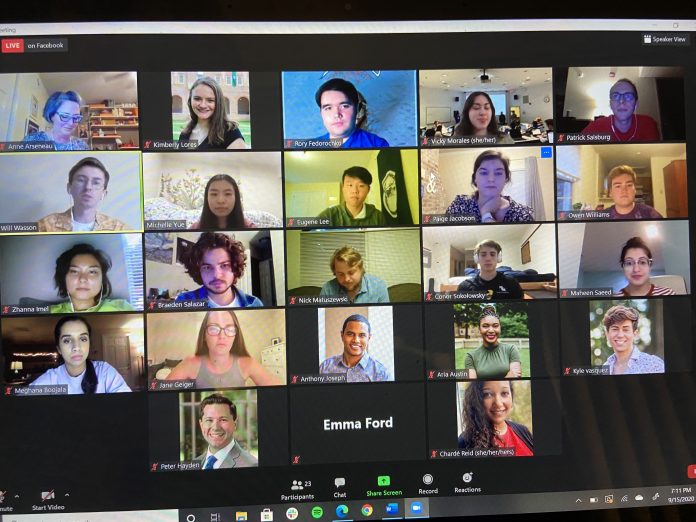At the Sept. 15 meeting of the College of William and Mary’s Student Assembly, senators debated whether the body’s proposed Virginia Institute of Marine Science Liaison Act violates SA’s Constitution, as there is institutional uncertainty if VIMS representative could receive senatorial voting power due to concerns over payment of the university’s Student Activities Fee.
Senators contested whether the phrasing in Article I, Section I, Clause II of SA’s constitution allowed for SA to appoint a graduate student from VIMS as an ex-officio liaison who would not hold voting power in the Senate.
The Clause states, “there shall be seven Senators from the graduate schools, apportioned among the schools as the graduate council shall designate, provided every school is represented by at least one Senator.”
Class of 2021 President Aria Austin ’21 said that the line “provided every school is represented by at least one Senator” signifies SA has a constitutional obligation to give VIMS a graduate senatorial seat with full voting rights in the Senate. She also expressed unease with the act’s premise that a VIMS student could not have a graduate senatorial position since graduate students do not pay the Student Activity Fee.
“I’m not sure this bill is constitutional,” Austin said. “ … I mean, VIMS has a senator according to our constitution. If we’re going to do this, I think we need to reconcile the fact that VIMS and the School of Ed, who do not currently have senators in Student Assembly, have one according to the constitution. So it doesn’t make sense to create a liaison position, when the constitution says that we already have a senator … The other thing is, I don’t necessarily feel comfortable with the language being about Student Activities Fees, because nowhere in the constitution or the code does it say that we have voting power due to our fees. I don’t see that in there, and I don’t think that we should attach voting to that concept of fees, because as representatives of the student body, we represent part-time students, we represent medical underloads, and I don’t think we should be shaping representation for those around the fact that it’s about student fees. So I think if we wanted to do something like this, we should fix the constitution.”
“If we’re going to do this, I think we need to reconcile the fact that VIMS and the School of Ed, who do not currently have senators in Student Assembly, have one according to the constitution. So it doesn’t make sense to create a liaison position, when the constitution says that we already have a senator … The other thing is, I don’t necessarily feel comfortable with the language being about Student Activities Fees, because nowhere in the constitution or the code does it say that we have voting power due to our fees. I don’t see that in there, and I don’t think that we should attach voting to that concept of fees…”
Senate Chair Meghana Boojala ’22 said that the Graduate Council shall designate the seven senator positions and said she believed that SA should bar a VIMS’ representative’s voting rights on the basis of the Student Activities Fee.
Currently, all undergraduate students pay $98 for their Student Activity Fee and all graduate students, except those at VIMS, pay half price for their fee.
Sen. Peter Hayden M.B.A ’21, then, introduced an amendment to the Act that would allow VIMS representatives to have voting power in all bills that requiring the allocation of funds.
In response to the amendment, Sen. Will Wasson J.D. ’21 supported VIMS representatives not receiving voting power, but expressed concern over the ex-officio liaison executive and the potential voting power under Hayden’s amendment. Wasson argued that by giving VIMS this position, the Senate then creates a precedent for creating positions too similar to that of a senator that are less effectively governed by SA’s Constitution.
Boojala ultimately decided to table the Act, as she felt as though there was more discussion needed to be had regarding the constitution’s contradictory language and the Act as a whole.
Senators also passed the Subsidized Emergency Contraception Act, COVID-19 Edition, which allocates $1,500 from SA Reserves for the purchase of 75 doses of Levonorgestrel emergency contraception. The Student Health Center will subsidize the cost of this emergency contraception to $5 a dose. This bill serves as a follow-up to last year’s Subsidized Emergency Contraception Act, although this year, the funding was cut from $3,000 to $1,500 because of expectations for lower demand.
Also at the meeting, SA President Anthony Joseph ’21 announced that the executive branch, including himself, SA Vice President Kyle Vasquez ’21 and SA Chief of Staff Loni Wright ’21, had decided not to sign SA’s recently passed No Class on Election Day Resolution. The act calls on the College’s administration to cancel classes and assignments Election Day, Nov. 3.
Joseph said his administration would refrain from signing the legislation because they felt that it was impractical to ask the administration to cancel classes so close to Election Day, as the College’s academic calendar is made years in advance, and because COVID-19 constraints have already shortened the semester.
However, Joseph said he supported the spirit of the resolution, and hopes to work toward its goal in future years. Moving forward, the resolution will stand as a statement of the Senate, even without the signatures of the executive branch.
Also at this week’s meeting:
- Paige Jacobson ’22 and Michelle Yue ’23 were confirmed as members of SA’s Review Board.
- Senators unanimously passed the Memorial Art Display Act, which allocates $900 for the art supplies for the upcoming art memorial to enslaved African Americans in Sadler Center. The bill was approved by the Finance Committee for immediate funding, meaning that the Office of Student Leadership Development will now need to approve its funding.

